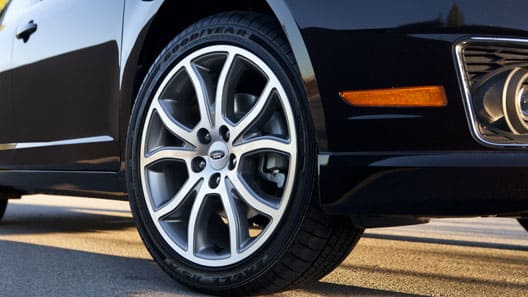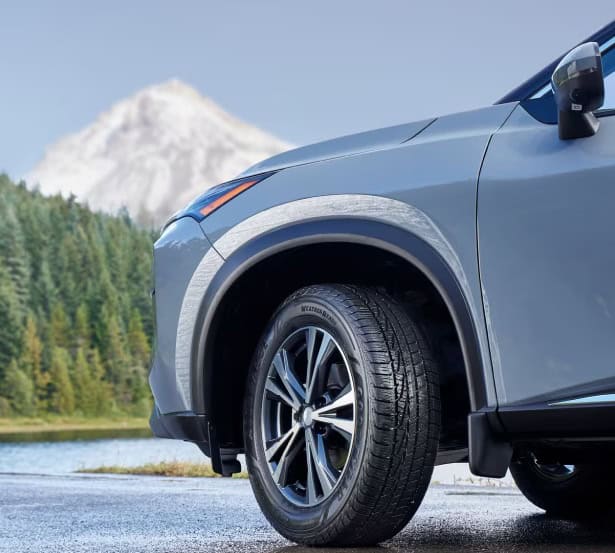Can I add chains to summer tires for winter use?
No, adding chains to summer tires for winter use is not recommended. Summer tires are designed to provide optimal performance in warm weather conditions, with a tread pattern and rubber compound specifically formulated for enhanced grip on dry and wet roads. They can’t withstand the harsh winter conditions, including snow and ice.

Adding chains may provide some additional traction on icy surfaces, but it can also significantly compromise the handling and performance. The chains can cause excessive wear and tear on the tire tread, potentially leading to reduced traction and stability on dry and wet surfaces. They can also damage the tire sidewalls and wheel rims.
Using dedicated winter tires in Kelowna, BC, for driving in snowy and icy conditions is always best. Winter tires have a tread pattern and rubber compound that provide superior traction and grip in cold weather. They feature deeper and wider grooves to handle snow and slush and often incorporate special compounds that remain flexible in low temperatures.
Canada Winter Tires
Using winter tires ensures better handling, shorter braking distances, and improved safety during winter driving near Penticton and close to Vernon, BC, Canada. They are specifically engineered to perform in low temperatures and challenging weather conditions. Investing in it can significantly enhance your vehicle’s performance and safety on winter roads.
Here’s an example to illustrate the difference in performance between summer and winter tires:
Imagine driving on a snowy road in Kelowna, British Columbia, with summer tires. The lack of traction and grip can cause your vehicle to slide and lose control, making it challenging to navigate through the snow safely. On the other hand, with winter Kelowna tires, the specialized tread pattern and rubber compound provide better traction on the snow, allowing you to maintain control and navigate more easily.
In conclusion, adding chains for winter use is not advisable. Investing in dedicated winter rubber designed for snowy and icy conditions is recommended to ensure optimal performance and safety during winter driving.
Is it acceptable to use gently used rubber during the summer?
Using used road tires in good condition during the summer can be acceptable, depending on various factors. The primary consideration should be the overall quality and safety.
When evaluating used products, it’s essential to inspect them for signs of wear, such as tread depth and any visible damage. Tires with sufficient tread depth and no significant damage can still provide satisfactory performance during the summer months. Additionally, it is vital to check the age as might be prone to degradation and safety concerns, regardless of their condition.
Consider your driving conditions and habits to determine if the tires suit summer use. If you primarily drive on dry roads, the performance of used tyres can still meet your needs. However, if you frequently drive on wet or slippery surfaces, opting for new or specialized summer tyres that offer better traction and handling is recommended.
Furthermore, consider the vehicle’s weight and load capacity. If the used tires match the manufacturer’s recommended load index for your vehicle, they should be safe for use during the summer.
It’s worth noting that new tires generally offer better performance, durability, and safety compared to used ones. However, if your budget is limited and you have thoroughly inspected the used tires to ensure they meet the necessary criteria for safety and performance. In that case, they can be a viable option.
Examples:
1. If you have a secondary vehicle that you use occasionally during the summer months, using used tires in good condition can be an economical choice.
2. If you live in an area where summer temperatures are not extreme, and the roads are well-maintained, using used tires that are in good condition can be acceptable.
3. If you conduct regular inspections, maintain proper tire pressure, and drive responsibly, using used tires in good condition during the summer can be cost-effective without compromising safety.
In any case, it is advisable to consult with a professional tire expert or mechanic who can assess the condition of the used tires in Kelowna, BC, and provide specific recommendations based on your driving needs and safety requirements.
What problems can I find with used tires?
When it comes to purchasing used tires in West Kelowna, there are a few potential problems that you may encounter. It’s important to be aware of these issues to make an informed decision and ensure your safety on the road.
1. Tread Wear: Used tires may have significant tread wear, impacting their performance and safety. Tires with low tread depth have reduced traction, especially on wet or slippery surfaces, increasing the risk of skidding or hydroplaning, potentially leading to accidents.
Example: Purchasing a used tire with minimal tread depth may not provide adequate grip on the road during heavy rain, resulting in losing control over your vehicle.
2. Internal Damage: Used tires might have internal damage that is not immediately visible, including bulges, sidewall damage, or separation of the layers within the tire. These problems can compromise the tire’s structural integrity and increase the risk of a blowout while driving.
Example:
You may purchase a used tire that appears in good condition but may have internal damage that goes unnoticed. While driving at high speeds, the tire could suddenly burst, causing a dangerous situation on the road.
3. Age and Deterioration: Even if a used tire appears in good condition, it may still be old and deteriorated. Tires degrade over time, especially if they have been exposed to harsh weather conditions or have not been properly stored. Old tires can become brittle, increasing the chances of a sudden failure.
Example: If you purchase a used tire several years old, it may have gone through extreme heat and cold seasons, making the rubber brittle and prone to cracking. As a result, the tire may fail unexpectedly, potentially causing an accident.
4. Unknown History: When purchasing used tires, you may not know the complete history of the tire, including how it was used, maintained, or repaired. The tire may have been subjected to excessive wear, overloading, or improper repairs, significantly impacting its performance and safety.
Example:
You discover that the tire you bought had been repaired multiple times for punctures, which weakens its overall structure. This weakness can increase the risk of a blowout or tire failure while driving.
We recommend thoroughly inspecting used tires before purchasing them to avoid these problems. Look for signs of wear, bulges, or any other visible damage. Additionally, check the manufacturing date on the tire sidewall to ensure it is not too old. Consider purchasing from reputable sellers who provide information about the tire’s history. If you are looking for quality tires for sale in Kelowna, your trusted car dealer in Kelowna is Orchard Ford.






